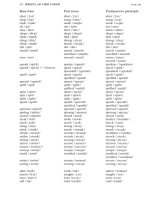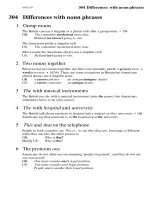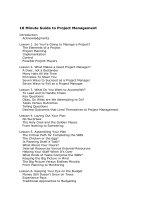Your guide to...Buying your first car docx
Bạn đang xem bản rút gọn của tài liệu. Xem và tải ngay bản đầy đủ của tài liệu tại đây (804.97 KB, 10 trang )
Buying your first car
Your guide to
Buying-your-first-car.qxd:Layout 1 13/10/09 09:21 Page 3
Buying a car is a big decision.
It can be
exciting,confusing and costly.
The information in this leaflet has been put together
by Trading Standards professionals and
Consumer
Direct
to help you make the right choices.
Buying a car is often one of the
BIGGEST purchases
you can make and it is not only the cost of the car,
but all the other expense that comes with it like
the
repairs, insurance, tax and fuel that you need
to think about.
Our easy to use guide is designed to give you a
starting point on what to look for when choosing
your car. Whether it is a second hand car from your
local paper or a car from a garage or auction, make
sure you know your rights.
By spending a little more time now, you could
save a lot more money!
Buying-your-first-car.qxd:Layout 1 13/10/09 09:21 Page 4
• How you pay for the car (e.g. cash, credit card, finance etc)
• Where you buy your car from
• The cost of the car and how much you pay
This can be a bit confusing, so you can call the Consumer Direct helpline that
works in partnership with Trading Standards to ask us questions about your
individual circumstances. Consumer Direct can advise on what to watch out
for, buying a car from an auction, from a car dealer, over the internet, from a
private seller and what to look for to make sure the car you are buying isn’t
stolen or has got outstanding finance on it. Consumer Direct’s number is listed
later in the guide.
How much should I be paying for the car I want?
By looking at a number sources for the car
you want, you will start to get a feel for
the price – so don’t go for the first one
you like, shop around!
There are a number of pricing guides that
will give you a better idea of the value of a
car based on its age and mileage. Glass’s
(www.glass.co.uk), Parkers guide
(www.parkers.co.uk) free online guides
(e.g. www.usedcarexpert.co.uk,
www.visitcars.co.uk) and many more can
also help. Ensure you know and can consider
the cars mileage that you are looking to
buy and its condition – as both of these
will affect its price. All of these sources act
as a guide, so there will be some variation.
Did you know that the following factors can affect your
rights when buying a car – regardless if it is new or used?
Before you buy the car
Call Consumer Direct on
08454 04 05 06 for more advice
Buying-your-first-car.qxd:Layout 1 13/10/09 09:21 Page 5
Consider the following points to guide you through the
process when you are choosing which car to buy:
Do you want to buy a new or a used car?
Compare the price of the car you are interested in with similar ones of the same age,
model, mileage etc. Examples of the pricing guides are listed on the previous page.
Do you already have a car in mind?
If so, do you have someone that can give you independent advice and help
you check the car out? You can get independent advice from ‘friendly experts’
from companies such as the AA, RAC and Green Flag. They may charge a fee
but they know what they are looking for. Does a friend/family member have a
good working knowledge of cars? Maybe they use reputable garage that could
help advise you. The Good Garage Scheme (www.goodgaragescheme.co.uk)
and the Office of Fair Trading (OFT) Approved Codes scheme www.oft.gov.uk
can help you find businesses that have signed up to a code of conduct.
A 'HPI' or a Vehicle History check should always be done before you make a
purchase. This is explained a little further on.
How much can you afford?
The table below will help you compare the costs of different cars. You should take
the following things into consideration; the cost of the car, your insurance, tax
(available for a six or 12 month period), MOT, servicing and average fuel
consumption – the number of miles per gallon (MPG) a car averages can help you
calculate this. Also consider breakdown cover. The table below can be used to help
you compare the costs of your shortlisted favourite cars.
Before you buy the car
Sellers name and contact details:
Car make, model, engine size and year of manufacture:
Cost of the car £
Cost to insure (3rd party or fully comprehensive cover?) £
Cost of road tax (6 or 12 months) £
Annual MOT + possible repair costs £
Average use/fuel costs £
Annual breakdown cover £
Total £
Buying-your-first-car.qxd:Layout 1 13/10/09 09:21 Page 6
Examine the car – do this
during clear daylight conditions,
when the car is dry. Check the
paintwork, condition of the car
and its tyres, look for any rust, dents,
marks or faults. The Consumer Direct
car checklist will give you a starting
point on what you should be looking
for. Find it on the Consumer Direct
web pages about cars under the
‘Goods and Services’ section at
www.consumerdirect.gov.uk
Test drive the car – It is your
responsibility as a buyer to
beware so make sure you
thoroughly test the car before
you buy. Test driving the car is your
opportunity to ensure that you are
happy with the vehicle and to satisfy
yourself that there are no mechanical
problems or faults. Make sure you
drive a reasonable distance to use
each of the gears, the clutch, test the
indicators, windscreen wipers,
locking system etc.
Do some detective work
and check out independent
car reviews
It is always worth looking at a
number of independent reviews about
the make and model of the car you
are thinking of buying. Sources such
as the Which Magazine, Auto Trader
and What Car Magazine are just a few
sources that you can look at for
independent reviews. This will help
you find out the best bits and the
worst bits about your new vehicle.
This could include problems with the
type of car you are thinking of buying,
common faults, safety issues as well
as handling, added extras,
modifications etc.
Don’t be afraid to try and
negotiate with the seller for a
reduction in the price or
request additional extras as part of
your bargaining. See if you can get
them to supply the vehicle with a
longer valid tax disk, check if the
MOT has recently been done – if it’s
due to expire request that this is done
before you make the purchase. The
best advice is to buy a car with a new
Preparing to buy your car - Key Actions
Always check all documents
and paperwork before agreeing
to or signing anything.
1
2
3
4
Buying-your-first-car.qxd:Layout 1 13/10/09 09:21 Page 7
Dealing with money and finance when buying a car can be mind boggling, so listed
below are some of the common terms you may come across. The Government’s
Financial Service Authority (FSA) has information to help you find your way through the
maze of words and terms used when companies are talking about finance. The FSA’s
details are in the “Useful Information” section at the back of this guide.
Money matters
What a deposit means
A deposit works in two ways.
• For you, it is a commitment to the
person you are buying the car from
to say that you want the car and that
you are entering into a legal agreement
to buy it.
• For the seller it is the guarantee that
you will be purchasing the car and that
they aren’t able to sell it to anyone else.
Check the terms and conditions of the
deposit carefully as it can be non-
refundable in some cases.
Always get a receipt – even if it is just for
a deposit. This is your proof that you have
given the seller your money.
What to watch out for
HP – Hire Purchase (sometimes
known as Conditional Sale)
HP is a form of credit. With other forms of
credit such as a loan or credit card, the
goods you buy belong to you straight
away. HP is different:
• You don’t legally own the car/vehicle
until you’ve paid back all the money
you owe (this can be over a number of
months or years). This means that you
cannot modify or sell it them without
the credit lender’s permission.
• Your contract is with a finance
company (not the retailer/garage) who
will own the goods until the final
payment is made
• The finance company can take the
goods back if you don’t keep up your
repayments.
• If you want to hand the car back you
will be liable for any damage caused to
the goods during the contract period.
Call Consumer Direct on 08454 04 05 06 for more advice
or visit the ‘Before you Buy’ pages of the Consumer Direct website under the
‘Money and Finance’ section there is additional information about HP agreements
www.consumerdirect.gov.uk/before_you_buy
Buying-your-first-car.qxd:Layout 1 13/10/09 09:21 Page 8
Consumer Direct
Call 08454 04 05 06 or visit
www.consumerdirect.gov.uk
This is an impartial advice service run
by the Office of Fair Trading in partnership
with Trading Standards. Specialist
advisors are on hand to answer questions
you may have before you buy or if you
have a problem with a purchase you have
made. Online there are template letters
and top tips offering you clear, practical
consumer advice.
TSI – Trading Standards Institute
www.tradingstandards.gov.uk
This is the professional body for Trading
Standards nationally.
Direct Gov
www.direct.gov.uk
This website shows you a range of
information issued by the Government.
Search under ‘motoring’ for a range of
information about owning a car, your
license and road safety.
FSA
The Government’s Financial
Services Authority (FSA). Call the FSA
on 0300 500 5000 or visit
www.moneymadeclear.fsa.gov.uk
This website has lots of useful information
about loans, budgeting and managing
your money.
DVLA – Driver and
Vehicle Licensing Agency
www.dvla.gov.uk
This is the government Department
responsible for driving licences,
learning to drive, entitlement to drive,
endorsements/disqualifications, driving
abroad and what to do when you have
changed your address and/or name.It also
deals with information on registering your
vehicle tax for your car number plates and
registration marks (including personalised
registration numbers), importing/exporting
vehicles, fighting vehicle crime and advice
on buying a used vehicle.
VOSA – Vehicle and
Operator Services Agency
www.vosa.gov.uk
VOSA provides a range of licensing,
testing and enforcement services.
This includes things like MOT’s.
Useful websites and
sources of information
Buying-your-first-car.qxd:Layout 1 13/10/09 09:21 Page 1
There are many important documents that you must be given
when you purchase a car to show that you are able to drive it
legally, prove that you are the registered keeper and ensure
that the car is roadworthy.
Insurance and driving licence
To drive legally you need both of these and are legally
obliged to show the information if stopped by the police.
Log Book/ V5 C
This is now known as a Vehicle Registration Certificate (V5C)
with a distinctive blue front page. This should be one of the
pieces of paperwork you receive when you buy the car and
details information on the transfer of ownership. As the buyer,
you should be given the green section known as the V5C/2
section. Ensure both the blue and the green sections contain
the same information.
Full Service History (FSH) documentation
This can include the service log which details the number of
times the car has been serviced and it’s mileage. It should
also include any paperwork regarding repairs or replacement
parts that have been fitted to the vehicle.
VIN (Vehicle Identification Number)
This number is a unique number used by the motoring
industry to identify individual vehicles. Check it matches the
number inside the V5C registration certificate (described
above) issued by the DVLA or DVLNI and it can also usually
be found in the service book. You can find the VIN in several
places on the car. It is engraved on a metal plate usually
found in the engine compartment. Be suspicious if it shows
signs of having been tampered with such as rivets having
been disturbed and if it has been removed ask why. The VIN
is also stamped on the chassis of the vehicle, often under
the bonnet or in the floor panel on the driver’s side.
Paperwork and information checklist
Buying-your-first-car.qxd:Layout 1 13/10/09 09:21 Page 9
HPI check
This used car check tells you the truth about a used car and
can highlight if your car has been written off, in an accident,
is stolen or has outstanding finance. The check confirms
many details about a car including the make, model, colour,
door plan, and engine size. Their data checks that these
match the descriptions recorded against the vehicle at the
time of manufacture, protecting the interests of the motorist
and helping car dealers meet their legal obligations. There
are many companies that offer ‘HPI’ checks. Always make
sure that the official logo is displayed, and that the cost of
the report and the details of the company carrying out the
checks are given to you. Other companies do the same
checks as HPI such as Experian, Carfax, my car check etc.
MOT
The vehicle’s MOT certificate confirms that your vehicle,
at the time of its test, met the minimum acceptable
environmental and road safety standards required by law.
It is your responsibility to renew it annually.
Tax Disk
The car requires a valid tax disk to be displayed to
be legal on UK roads.
Receipt
This is your proof of purchase, how much you paid and
when you bought the car. If you are buying a car using
credit or finance, make sure you have a copy of the
signed agreement.
Full details of the person/garage/auction selling the car
Including full name, address (not a PO Box address) and
landline telephone number. You will need this information if
there is a problem later down the line.
Make sure you keep all this information in a safe place.
You will require this information as you renew things like your insurance,
tax and the MOT, or if you choose to sell the car at a later date.
Buying-your-first-car.qxd:Layout 1 13/10/09 09:21 Page 10
Thinking of buying a car for the first time?
Seen one you like but don’t know where to start?
Buying your first car can be a big decision and it can be a bit confusing.
This guide offers you information to help you make the right choices
when choosing which car to buy and is packed with a range of top tips
and advice including:
• what to look out for
• the true cost of a car
• managing your money
• useful websites and sources information
It should make your journey to buying your first car a little easier.
Put together by Consumer Direct and Trading Standards professionals,
this guide offers you clear, practical advice that is impartial – so by
spending a little more time and reading our guide… it could save you
money and time in the long run.
Buying-your-first-car.qxd:Layout 1 13/10/09 09:21 Page 2









